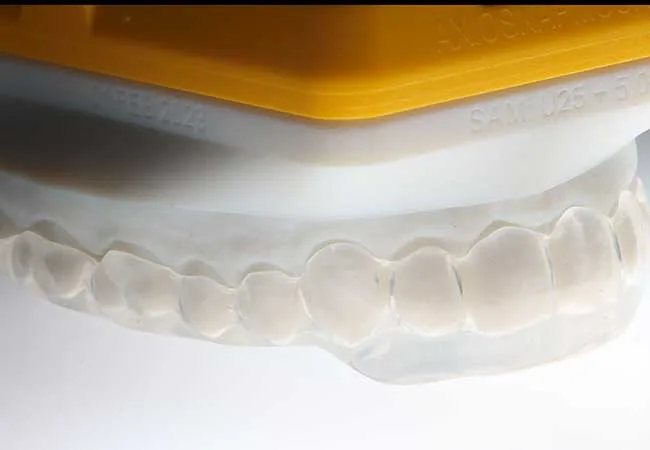Many people grind their teeth at night, a habit that exerts great force, which in the long run can lead to a considerable loss of tooth enamel and damage to both fillings and crowns. Bite splints are designed to prevent this type of damage. The Carolinum, Goethe University Frankfurt’s dental clinic, is looking for test subjects for a new material study.

It affects about one fifth of the adult population, and occurs mostly at night: unconsciously grinding or pressing teeth together. The phenomenon, known by the medical term „bruxism“ (derived from the ancient Greek βρυγμός brygmos, „the grinding of teeth“), can have various causes, including a malocclusion of the teeth/jaw, or stress. The long-term consequences are often unpleasant: as a result of the constant pressure, the periodontium wears out; teeth, dental crowns and fillings can be damaged; and harm can also come to the temporomandibular joint, the masticatory muscles and other muscle groups that are constricted to stabilize the head.
So-called bite splints, which can be worn at night, help reduce such damage. Before going to sleep, the splint, which is made of plastic, is placed on the teeth of one jaw, where it snaps into place with a slight click. Since the plastic that makes up the splint is not as hard as the teeth, the pressure on the latter is slightly reduced, thereby avoiding further wear of the healthy tooth structure. As part of a study on different plastics, the Goethe University’s Carolinum dental clinic is currently looking for people who grind their teeth.
The right and left sides of the splint are made of different materials that will be tested in the planned study. Both materials are CE certified, but their manufacturing process is different. Both are also transparent when polished (Fig. 1). In most cases, the splint is manufactured for the maxilla (Fig. 2).
Study participants receive a splint free of charge, which they have to wear regularly every night for one year. During this time, the wearing comfort is documented using questionnaires, while the quality of the splint material is examined during several control appointments. At the end of the wearing phase, the splint will return to the Carolinum for further evaluation. As is usual for medical studies, this study was also approved by the Ethics Committee of the Faculty of Medicine at Goethe University Hospital.







